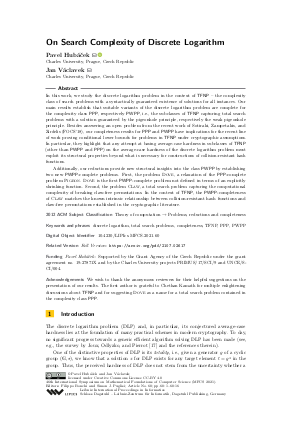@InProceedings{hubacek_et_al:LIPIcs.MFCS.2021.60,
author = {Hub\'{a}\v{c}ek, Pavel and V\'{a}clavek, Jan},
title = {{On Search Complexity of Discrete Logarithm}},
booktitle = {46th International Symposium on Mathematical Foundations of Computer Science (MFCS 2021)},
pages = {60:1--60:16},
series = {Leibniz International Proceedings in Informatics (LIPIcs)},
ISBN = {978-3-95977-201-3},
ISSN = {1868-8969},
year = {2021},
volume = {202},
editor = {Bonchi, Filippo and Puglisi, Simon J.},
publisher = {Schloss Dagstuhl -- Leibniz-Zentrum f{\"u}r Informatik},
address = {Dagstuhl, Germany},
URL = {https://drops-dev.dagstuhl.de/entities/document/10.4230/LIPIcs.MFCS.2021.60},
URN = {urn:nbn:de:0030-drops-145006},
doi = {10.4230/LIPIcs.MFCS.2021.60},
annote = {Keywords: discrete logarithm, total search problems, completeness, TFNP, PPP, PWPP}
}

 Creative Commons Attribution 4.0 International license
Creative Commons Attribution 4.0 International license
